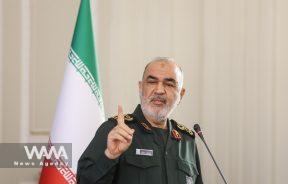All those who agree or disagree with participating in the election
WANA (June 27) – Today is the last day of the campaign for the 14th presidential election in Iran. The coming hours will be critical for at least three prominent candidates in this race: Ghalibaf, Pezeshkian, and Jalili.
The financial support, whether small or large, from their supporters can be observed in the quality of their urban advertisements. Ghalibaf, who has been the mayor of Tehran for years, has successfully attracted funds for vibrant advertising in Tehran and other provinces.
Ghalibaf, who entered the competition with the slogan “Service and Progress,” has promised salary increases, inflation control, and housing provisions in his campaign banners.
The reformist candidate for the presidency, Massoud Pezeshkian, has tried to minimize the use of his image in advertisements and instead persuaded the silent supporters in the elections to come to the polls and elect him to solve these issues through protest texts.
Jalili’s campaign appears to lack significant funding for street advertisements. He has tried to attract supporters from citizens outside Tehran and in other provinces and villages through election tours and campaigns. Jalili’s slogan is “A World of Opportunity, an Iran of Leap.”
The efforts of all candidates to encourage more people to participate in the elections have been noticeable in this period. Some find these efforts somewhat effective, while others see them as futile.
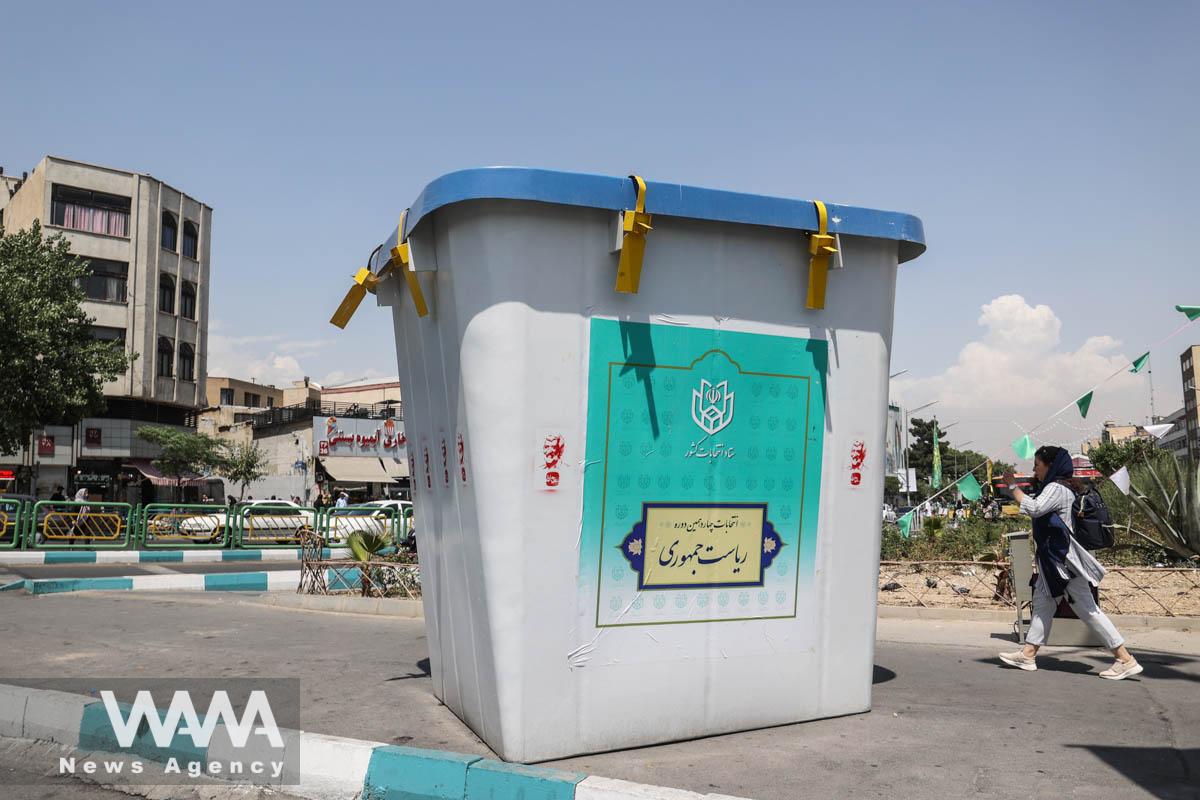
A woman walks past a symbolic ballot box for the presidential election in a street in Tehran, Iran June 27, 2024. Majid Asgaripour/WANA (West Asia News Agency)
The Iranian government, which has a good track record of encouraging maximum participation in elections, has faced a low turnout crisis in recent years. Breaking the 85% participation record in 2009, which led to Ahmadinejad’s election, or the 80% turnout in 1997, which resulted in Seyyed Mohammad Khatami’s victory, seems somewhat unlikely.
Experts cite various reasons for the decline in participation in recent years. Poor economic conditions, sanctions, management policies, inflation, low wages, street protests in recent years, and others are reasons for the public’s lack of motivation to participate in the elections.
“I will definitely participate in the elections because it is a national duty. We must participate. Indifference and passivity in society do not bode well for us.” This was the opinion of Amir Ali Zamani, a Master’s student in Political Science, in an interview with a WANA reporter on Valiasr Street in Tehran about participation in the upcoming elections.

Pezeshkian, the Moderate Activist
WANA (June 26) – Today, Iran needs a “moderate activist” like Mr Pezeshkian, who, besides having positive personal qualities such as financial integrity, honesty, transparency, and noble candour, has an outstanding characteristic: being a “moderate activist.” Pezeshkian, the reformist presidential candidate, operates on the boundary between the people and the government. He is part […]
In contrast to Amir Ali’s opinion, another individual named Modabber on the same street at Valiasr Square, adorned with a large banner of all the candidates, believes, “I will not participate in the elections because, like previous years, I think it has no impact on the political and economic process for the people and the country.”
These two people, with different perspectives, provided different opinions on the question of whether it matters to them who becomes president and with how many votes. Amir Ali believes, “A president with popular support can influence international communities to break the sanctions.” However, Modabber sees Iran’s foreign policy as predefined and does not believe it will change with a change in the president.
So far, most polls predict a turnout of around 50%. But can the government and the candidates change this statistic in these final hours?
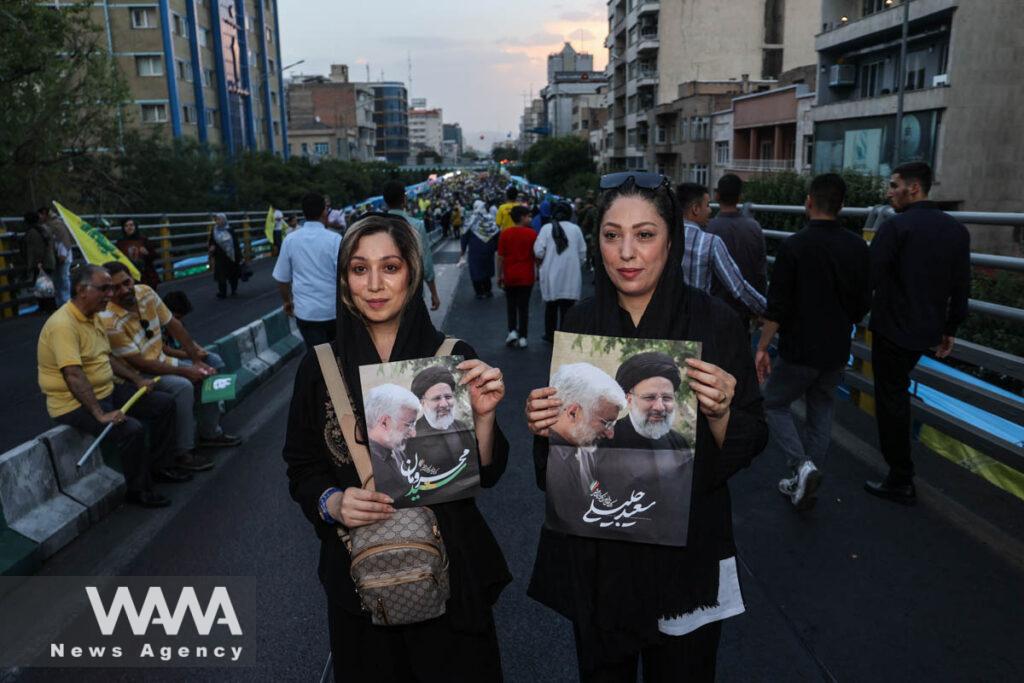
Supporters of Iranian presidential candidate Saeed Jalili attend the Ghadir Eid festival in Tehran, Iran June 25, 2024. Majid Asgaripour/WANA (West Asia News Agency)
Ensuring security on Iran’s presidential election day
Terrorist and sabotage operations have occurred at various times in Iran. As a country with many shared borders with insecure countries like Pakistan, Iraq, Afghanistan, and Azerbaijan, Iran is always concerned about its security.
However, in the last 45 years, there has been no news of a significant sabotage attack on election day in Iran. The Iranian government is more concerned about street unrest by supporters of the Western front within the country than terrorists.
The police spokesperson announced that on June 28th, Iran’s police are on standby to ensure election security. More than 220,000 troops, nearly 190,000 of whom maintain a constant presence at the polling stations from the commencement to the conclusion of the vote count, are dedicated to ensuring the security of the elections.
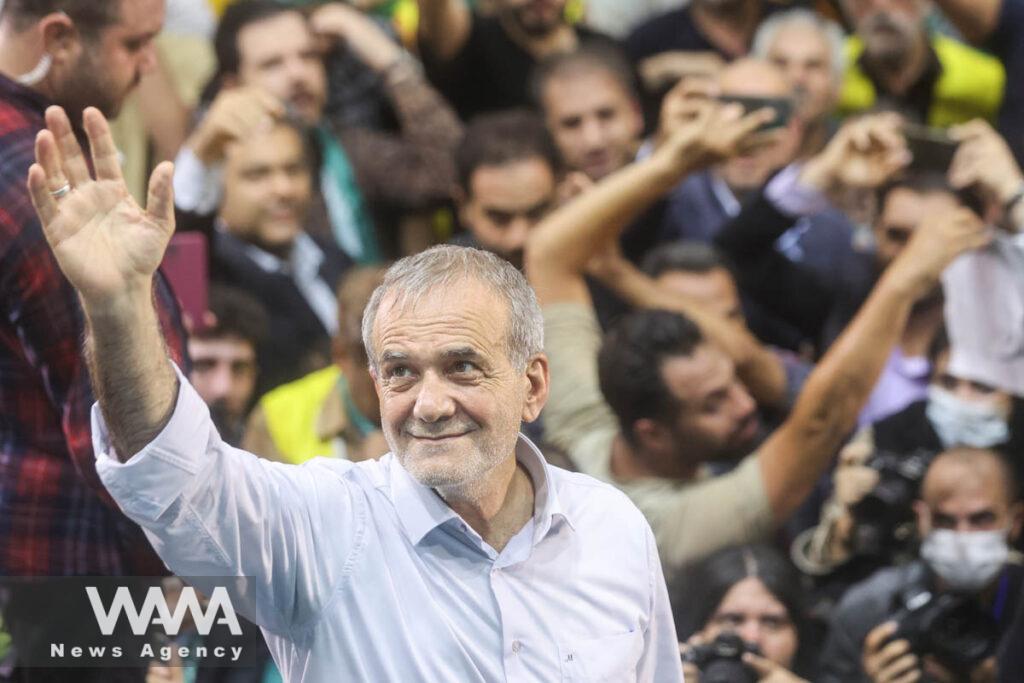
Iranian presidential candidate Masoud Pezeshkian waves during a campaign event in Tehran, Iran, June 23, 2024. Majid Asgaripour/WANA (West Asia News Agency)
The “Plus One” campaign, the suggestion of Iran’s Supreme Leader’s website for more participation
On June 25th, Iran’s Supreme Leader, Ayatollah Khamenei, in a gathering of people regarding the importance of participation in the elections, said, “People should not be lazy, indifferent, or underestimate it; they should participate in elections in all corners of the country.”
In this regard, the Supreme Leader’s website launched a campaign titled “Plus One” with the idea that each user intending to participate in the elections should persuade one of their acquaintances or friends who has not yet decided to vote.
Mokhber, the acting president, in a brief interview with domestic media, described participation in the elections as a political, religious, and legal necessity, saying, “People must partake in determining the fate of their country.”
Both reformist and conservative leaders have been sending various messages to the public these days, encouraging them to participate in the elections for different reasons.
Meanwhile, opposition groups, primarily residing outside Iran, using media outlets like “Iran International,” managed by Israel’s Mossad, along with BBC Persian and other anti-government media, are urging Iranians not to participate in these elections, viewing a vote for these candidates as an endorsement of the Islamic Republic by the majority.
By WANA Writers: R. Ganji & R. Hejazi
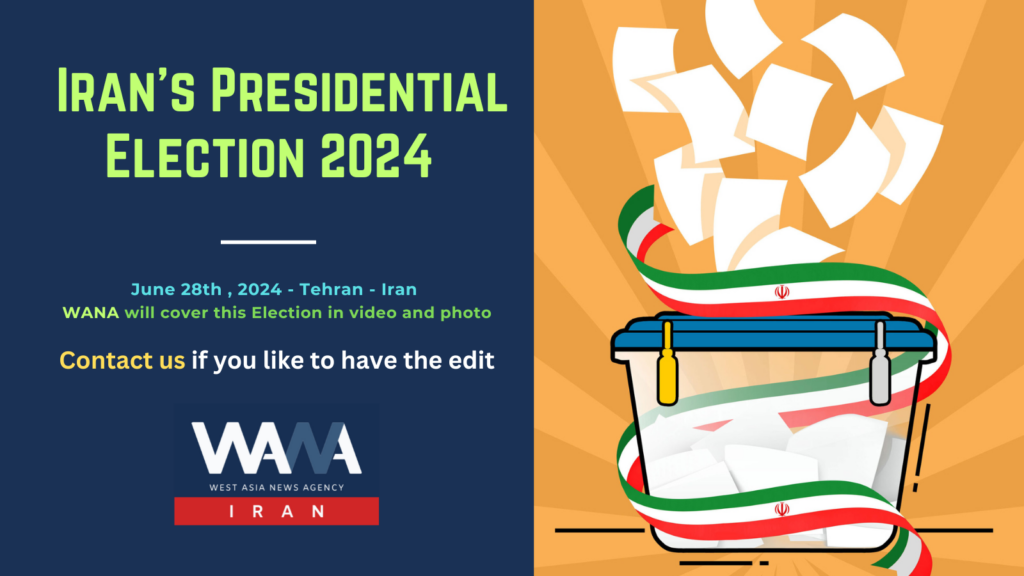
WANA – Iran’s presidential election 2024










